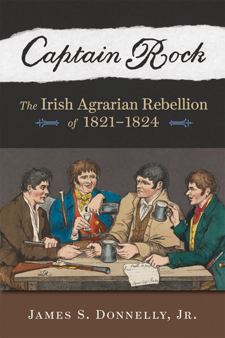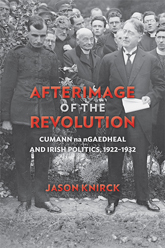Afterimage of the Revolution
Cumann na nGaedheal and Irish Politics, 1922–1932
Jason Knirck
History of Ireland and the Irish Diaspora
James S. Donnelly, Jr., and Thomas Archdeacon, Series Editors
“A major contribution to understanding the government of Ireland from 1922 to 1932, demonstrating that it remained committed to the revolutionary ideals of the 1916 Rising and the War of Independence.”
—John McCarthy, author of Twenty-First Century Ireland: A View from America
Ascending to power after the Anglo-Irish Treaty and a violent revolution against the United Kingdom, the political party Cumann na nGaedheal governed during the first ten years of the Irish Free State (1922–32). Taking over from the fallen Michael Collins and Arthur Griffith, Cumann na nGaedheal leaders such as W. T. Cosgrave and Kevin O’Higgins won a bloody civil war, created the institutions of the new Free State, and attempted to project abroad the independence of a new Ireland.
In response to the view that Cumann na nGaedheal was actually a reactionary counterrevolutionary party, Afterimage of the Revolution contends that, in building the new Irish state, the government framed and promoted its policies in terms of ideas inherited from the revolution. In particular, Cumann na nGaedheal emphasized Irish sovereignty, the “Irishness” of the new state, and a strong sense of anticolonialism, all key components of the Sinn Féin party platform during the revolution. Jason Knirck argues that the 1920s must be understood as part of a continuing Irish revolution that led to an eventual independent republic. Drawing on state documents, newspapers, and private papers—including the recently released papers of Kevin O’Higgins—he offers a fresh view of Irish politics in the 1920s and integrates this period more closely with the Irish Revolution.
 Jason Knirck is an associate professor of history at Central Washington University and the author of Women of the Dáil: Gender, Republicanism and the Anglo-Irish Treaty and Imagining Ireland’s Independence. Jason Knirck is an associate professor of history at Central Washington University and the author of Women of the Dáil: Gender, Republicanism and the Anglo-Irish Treaty and Imagining Ireland’s Independence.
Media & bookseller inquiries regarding review copies, events, and interviews can be directed to the publicity department at publicity@uwpress.wisc.edu or (608) 263-0734. (If you want to examine a book for possible course use, please see our Course Books page. If you want to examine a book for possible rights licensing, please see Rights & Permissions.)
Of Related Interest
 Captain Rock Captain Rock
The Irish Agrarian Rebellion of 1821—1824
James S. Donnelly, Jr.
“Donnelly’s knowledge of Irish rural society is both broad and deep, and this is by far the most thorough and insightful study of this tragic, complex, and very important episode in pre-famine Irish history.”—Kerby Miller, author of Emigrants and Exiles |
|
|

PAPERBACK ORIGINAL
February 2014
LC: 2013015049 DA
318 pp. 6 x 9
|
 Jason Knirck is an associate professor of history at Central Washington University and the author of Women of the Dáil: Gender, Republicanism and the Anglo-Irish Treaty and Imagining Ireland’s Independence.
Jason Knirck is an associate professor of history at Central Washington University and the author of Women of the Dáil: Gender, Republicanism and the Anglo-Irish Treaty and Imagining Ireland’s Independence.
